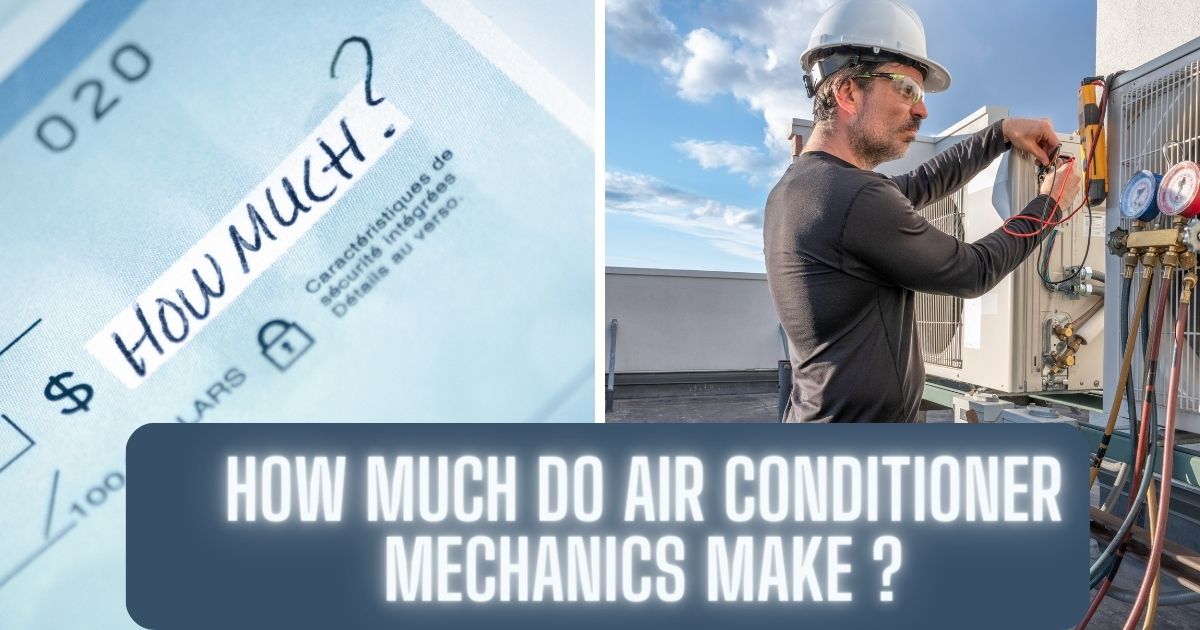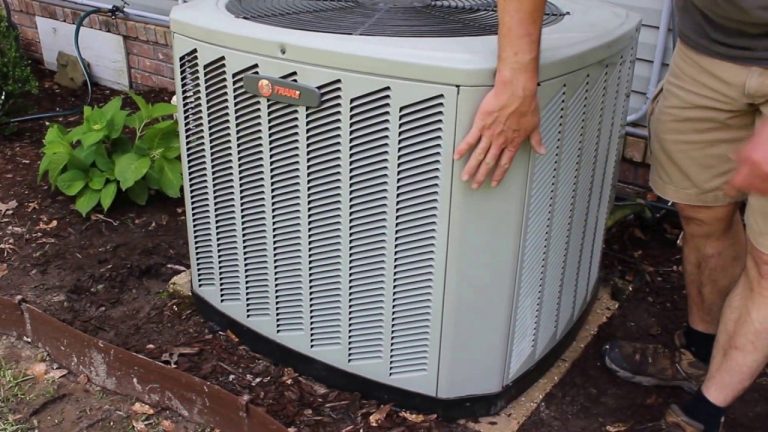How Much Do Air Conditioner Mechanics Make? Find Out Their Earnings
The average salary for air conditioner mechanics varies depending on factors such as experience, location, and employer. However, on average, air conditioner mechanics earn a median annual salary of around $48,730, according to the Bureau of Labor Statistics. These professionals are responsible for installing, repairing, and maintaining air conditioning systems.
Air conditioners are a vital part of our lives, keeping us cool and comfortable during scorching summer months. As we rely on these devices more than ever, the need for skilled air conditioner mechanics becomes increasingly important.
If you’re intrigued by the inner workings of HVAC systems, have a passion for repairing and maintaining air conditioners, or simply want to delve into an industry that offers steady work, you’ve come to the right place. In this article, we will explore the topic that’s been on the minds of many aspiring and experienced air conditioner mechanics: How much do they actually make? Whether you’re a novice considering a career in the field or an experienced technician wanting to enhance your skills, it’s crucial to understand the factors that affect your earning potential.
Are you curious about the average salary of an air conditioner mechanic? Wondering whether location, experience, or certification plays a significant role in determining your wages? Or perhaps you find yourself negotiating salaries and wanting to ensure your compensation aligns with industry standards. We’ll provide you with the answers and insights you seek. Throughout this article, we’ll break down the various factors that impact an air conditioner mechanic’s earning potential.
From exploring industry trends and demand in different regions to discussing the benefits of certifications and experience, we’ll equip you with the knowledge needed to take control of your career path. By the end of this article, you’ll have a clear understanding of what it means to be an air conditioner mechanic in terms of compensation. So, if you’re ready to dive into the world of HVAC systems and discover just how much potential lies within, let’s get started.

Factors Affecting Salary for Air Conditioner Mechanics
When it comes to determining the salary of an air conditioner mechanic, several key factors come into play. Understanding these factors will not only help you gauge your earning potential but also enable you to make informed decisions about your career. Let’s explore the main factors that affect how much air conditioner mechanics make.
1. Experience Level
Experience is a crucial factor that determines an air conditioner mechanic’s salary. As with most professions, the more experience you have, the higher your earning potential. When you’re just starting in the industry, you can expect to earn a lower salary compared to someone with several years of experience under their belt.
As an entry-level air conditioner mechanic, you’ll likely have the opportunity to learn from seasoned professionals and gain valuable hands-on experience. Over time, as you acquire more skills and knowledge, you’ll become more efficient at diagnosing and fixing air conditioner issues. This increased expertise will not only make you more valuable to employers but also allow you to command a higher salary.
2. Geographic Location
Where you work plays a significant role in determining how much you can earn as an air conditioner mechanic. Different locations have varying levels of demand for HVAC services, and this demand can impact your salary.
In areas with a high population density and extreme climates, such as desert regions or tropical areas, the demand for air conditioning is typically higher. This increased demand translates to more job opportunities and potential for higher wages. On the other hand, in regions with milder climates or lower population densities, the demand for HVAC services may be lower, resulting in lower salaries.
It’s essential to research the HVAC market in your area to get a sense of the demand and expected salary ranges. Keep in mind that cities or regions with a higher cost of living may offer higher salaries to compensate for the increased expenses.
3. Industry Certifications
Obtaining industry certifications can significantly impact an air conditioner mechanic’s earning potential. Certifications showcase your expertise, knowledge, and commitment to professional growth. They also demonstrate to potential employers that you are well-trained and capable of delivering high-quality work.
Organizations such as the North American Technician Excellence (NATE) offer certifications for HVAC technicians. By obtaining these certifications, you can differentiate yourself from non-certified individuals and potentially earn higher salaries. Employers often value certified technicians because they have demonstrated a mastery of essential skills and a commitment to industry standards.
While certifications may require an investment of time and money, they can provide a significant return on investment in terms of increased earning potential. Employers may be more willing to hire or promote individuals with certifications, leading to higher salaries and better job opportunities.
4. Specialized Skillsets
Beyond basic HVAC knowledge, developing specialized skillsets can open up doors to higher-paying positions within the air conditioning industry. These skills can include expertise in specific types or brands of air conditioning systems, advanced knowledge of energy-efficient technologies, or proficiency in the installation and maintenance of commercial HVAC systems.
When you acquire specialized skills, you position yourself as an asset in the industry. Employers value individuals who can handle unique challenges and offer solutions beyond what the average air conditioner mechanic can provide. With these specialized skillsets, you can negotiate higher salaries and potentially work on more complex and rewarding projects.
If you’re passionate about a particular area within the air conditioning field, consider focusing your professional development efforts on gaining expertise in that area. By becoming a specialist, you can set yourself apart from the competition and increase your earning potential.
5. Demand for Air Conditioning Services
The demand for air conditioning services plays a significant role in determining an air conditioner mechanic’s salary. As air conditioners become more common in households, businesses, and public spaces, the need for skilled technicians continues to grow.
In areas with a high demand for air conditioning services, there may be stiff competition among employers to attract and retain talented air conditioner mechanics. As a result, wages may be higher to incentivize technicians to choose one employer over another.
Additionally, advancements in air conditioning technology and increased emphasis on energy efficiency have created new opportunities for air conditioner mechanics. Technicians with knowledge of modern systems and energy-saving techniques are in high demand and can command higher salaries.
As an air conditioner mechanic, your earning potential is influenced by a variety of factors. Experience, geographic location, industry certifications, specialized skillsets, and demand for air conditioning services all play a role in determining your salary.
By gaining experience, obtaining certifications, developing specialized skillsets, and staying informed about industry trends, you can position yourself for higher salaries and better career opportunities. Remember to research the HVAC market in your area and take advantage of networking opportunities within the industry to stay ahead.
With dedication, a commitment to ongoing learning, and a passion for the field, you can thrive as an air conditioner mechanic and enjoy a fulfilling career.
How to Find AC Leaks in Your Car (UV Dye)
Frequently Asked Questions (FAQ)
How much do air conditioner mechanics make?
What factors affect the salary of air conditioner mechanics?
Do air conditioner mechanics earn more with additional certifications?
Are there opportunities for advancement in the field of air conditioner mechanics?
Is the demand for air conditioner mechanics increasing?
Final Recommendations for Maximizing Earning Potential as an Air Conditioner Mechanic
In conclusion, the salary of an air conditioner mechanic is influenced by several key factors. Firstly, experience plays a crucial role, with professionals who have more years of experience typically earning higher salaries.
Additionally, the geographic location can impact earnings, as areas with higher demand for HVAC services tend to offer more job opportunities and higher wages. Industry certifications can significantly increase earning potential, as they demonstrate expertise and commitment to professional growth.
Developing specialized skillsets can also open doors to higher-paying positions within the industry. Lastly, the demand for air conditioning services, driven by the increasing prevalence of air conditioners and advancements in technology, can lead to higher wages for skilled technicians. To maximize earning potential, aspiring air conditioner mechanics should focus on gaining experience, obtaining industry certifications, developing specialized skillsets, and staying informed about industry trends.
It is important to research the local HVAC market and take advantage of networking opportunities to stay ahead and secure better career opportunities. Ultimately, with dedication, ongoing learning, and a passion for the field, air conditioner mechanics can thrive in their careers and enjoy satisfying financial rewards. By considering these factors and taking proactive steps towards professional growth, individuals can pave the way towards a successful and rewarding career as an air conditioner mechanic.






